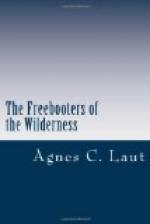Just once, the watcher felt a tremor for the rash climber. Wayland’s head was on a level with the crest of another ledge, his face to the rock, his left hand gripping a shoot of mountain laurel, his right groping the upper rocks. The old man saw the shrub jerk loose, moss, roots and all—he held his breath for the coming crash—it was all over. Wayland’s left arm flung out to ward off the spatter of small stones; then, the right arm had clutched the spindly bole of a creeping juniper—his body lurched out, hung, swayed, lifted; and the Ranger disappeared among the shrubbery of the upper trail.
The old man took a deep breath.
“And this is the Man on the Job,” he said. He drew behind his shelter and waited. “The same breed o’ men after all, in different harness.”
He had not noticed before, but there, ahead, where the black chasm of the Pass opened portals to the sunny blue of another valley, lay a lake, the Lake Behind the Peak, spangled with light, marbled like onyx or malachite, with the sheen of a jewel. Almost at his feet below, the near end of it lay. He could have tossed a pebble into it, seven-thousand feet below, where the white foaming river came ramping through a great pile of moraine that dammed up this end of the Pass to the width of a bridle trail. The outlaws would have to cross the lake to escape from the Pass; and almost, he thought, he saw the old punt at the far end, which Wayland had said hunters sometimes used.
The white butterflies flitted past his hiding place out to the light of the sun. The eagle was soaring strong-winged, swerving and lifting and falling in an insolence of languid power. The silent Pass quivered to the throb of waters. But what was doing with the Ranger? Not a sound came from the upper trail but the tinkle of hidden springs down the rocks. He knew if he uttered a shout, the echo would take up his call. An hour passed: two hours. Ghost shadows came creeping into the canyon. The butterflies had fluttered out to the blue portal where the rocks opened doors to the sun. The rampant roar of the river was quieting to the hollow hush. The old man rose, walked along the precipice, came back to his shelter, sat, stood up, examined the rifle, looked ahead where the horses had wandered on, fidgeted, and bemoaned the years that prevented pursuit up the rock face. He knew by the light and the hush that it must be almost five o ’clock.
And at five o’clock in the ranch house back in the Valley, Eleanor was lying in her room with her face buried in Wayland’s note, praying as only the young pray, with the worst and the best of their nature in the prayer; for where such love comes, all goes into the incense of the fire that goes up from the altar—the best and the worst of the inmost heart: an apotheosis of “give-me” and an utter abandonment of “let-me-give.” By and by, when we grow older, we leave both the “give me” and the “let-me-give” to God.




